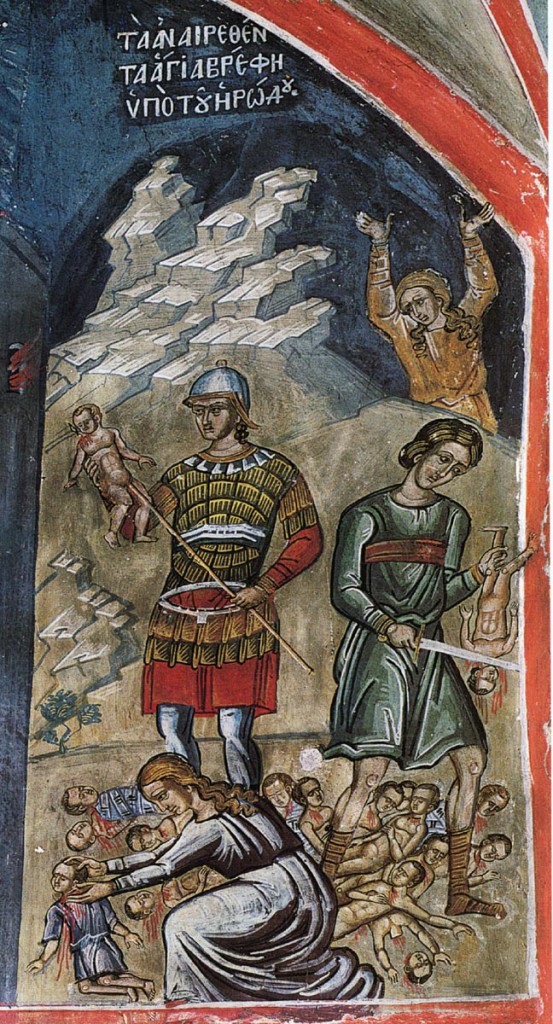Today is Childermas, the Feast of the Holy Innocents.
Lully, lulla, thou little tiny child,
By by, lully lullay, thou little tiny child,
By by, lully lullay.
O sisters too, How may we do
For to preserve this day
This poor youngling,
For whom we do sing,
By by, lully lullay?
Lully, lulla, thou little tiny child,
By by, lully lullay, thou little tiny child,
By by, lully lullay.
Herod, the King, In his raging,
Charged he hath this day
His men of might,
In his own sight,
All young children to slay.
Lully, lulla, thou little tiny child,
By by, lully lullay, thou little tiny child,
By by, lully lullay.
That woe is me, Poor child for thee!
And ever morn and day,
For thy parting
Nor say nor sing
By by, lully lullay!
The “Coventry Carol”, a lullaby of mothers to doomed children, dates to the 16th century. It was part of a Mystery Play, “The Pageant of the Shearmen and Tailors”, about chapter two of the Gospel of Matthew. The carol is about the Massacre of the Holy Innocents. The carol came to greater popularity after the BBC broadcast it at Christmas of 1940, after the Bombing of Coventry: it was sung in the ruins of the bombed Cathedral.
 There is sometimes attributed to St. Augustine a quote about the Holy Innocents with some beautiful imagery. Here it is… mind you, attributed to the Doctor of Grace:
There is sometimes attributed to St. Augustine a quote about the Holy Innocents with some beautiful imagery. Here it is… mind you, attributed to the Doctor of Grace:
These then, whom Herod’s cruelty tore as sucklings from their mothers’ bosom, are justly hailed as “infant martyr flowers”; they were the Church’s first blossoms, matured by the frost of persecution during the cold winter of unbelief.
Lovely, no? Augustine didn’t say that. It was Caesarius of Arles who preached:
Quos herodis impietas lactantes matrum uberibus abstraxit; qui iure dicuntur martyrum flores, quos in medio frigore infidelitatis exortos velud primas erumpentes ecclesiae gemmas quaedam persecutionis pruina decoxit. [s. 222, 2 in CCL 104]
Some interesting things are going on in the Latin. First, you need to know that gemma isn’t just “gem”, but can also be “bud, blossom”. Decoquo is “to reduce by boiling”. I found an interesting reference in Suetonius how Nero made a icy-cold drink decoction, a decocta. Pliny uses decoctum as a medicinal drink. Note the iuxtaposition of the heat indicated in decoquo and the cold of frost. The heat of persecution brought forth flowers before their day. Here is a literal rendering:
Whom the ungodliness of Herod dragged as nursing babies from their mothers’ breasts; who rightly are called the flowers of martyrs, whom the frost of persecution cooked up, grown up in the midst of the cold, bursting forth as the first buds of the Church.
Here is the Collect from the 1962 Missale Romanum:
Deus, cuius hodierna die praeconium Innocentes Martyres non loquendo, sed moriendo confessi sunt: omnia in nobis vitiorum mala mortifica; ut fidem tuam, quam lingua nostra loquitur, etiam moribus vita fateatur.
O God, whose public heralding the Innocent Martyrs professed this very day not by speaking but by dying; mortify in us every ill of vices; so that (our) life might confess Your Faith, which we speak with our tongue, also by (our) morals.
Look at the not-so-subtle change made to the Collect by the cutters and pasters who glued together the Novus Ordo:
Deus, cuius hodierna die praeconium
Innocentes Martyres non loquendo,
sed moriendo confessi sunt:
da, quaesumus, ut fidem tuam,
quam lingua nostra loquitur
etiam moribus vita fateatur.
Can you spell “bowdlerize”?
LITERAL VERSION:
O God, whose public heralding the Innocent Martyrs
professed this very day not by speaking but by dying;
grant, we implore, that (our) life might confess Your Faith,
which our tongue declares,
also by (our) morals.
That lingua nostra could, I suppose, be ablative, but it is probably the nominative subject of loquitur. I originally swerved that into “which we speak with our tongue”. There is a strong temptation to reconstruct these clauses when rendering it into English.
NEW CORRECTED VERSION:
O God, whom the Holy Innocents confessed
and proclaimed on this day,
not by speaking but by dying,
grant, we pray,
that the faith in you which we confess with our lips
may also speak through our manner of life.
Did the translator not get that fateor is deponent? The subject is vita, no? Accusative fidem is the object, not the subject.
What a mess.
OBSOLETE ICEL:
Father,
the Holy Innocents offered you praise
by the death they suffered for Christ.
May our lives bear witness
to the faith we profess with our lips.
I’ll stick with the older Collect in Latin, thank you very much.
St. Thomas Aquinas dealt with the question of how the Innocents could be considered martyrs if they didn’t yet have use of their free will so as to be able to choose death in favor of Christ and if they were not baptized. The Angelic Doctor answered that God permitted their slaughter for their own good and that their slaying brought them the justification and salvation that would also come from baptism.
This was a “baptism of blood”. In their deaths they were truly martyrs. And they were indeed for Christ, since Herod, fulfilling the prophecy of Jeremiah 31:15, killed them from ill-will for the new-born Christ.



































In connection with the Feast of the Holy Innocents, this evening our parish is having a “Memorial Mass for Unbaptized Children.” To me this seems a wonderful idea, but I have never heard of anything like this being done before. Is this totally unique to us or on the other hand is it utterly conventional liturgy?
Latin makes a distinction between “lactare” (to nurse), and “lactere” (to suckle). The infants are “lactentes” not “lactantes”. Just as “out of the mouth of infants and of sucklings” is “ex ore infantium et lactentium” – not as erroneously sometimes quoted “ex ore lactantium”. Mater lactat, infans lactet.
Andrew says: Latin makes a distinction between “lactare” (to nurse), and “lactere” (to suckle).
Well… sure it does. However, lacto, 1, means both, depending on context, in all periods.
Don’t be “duped” into thinking that Caesarius didn’t know about lacto – lacteo.
HINT: cf. the other lacto with a related but at the same time quite different meaning.
That is one haunting video Fr. Z.
If I remember the account of the WWII Coventry raid correctly, from FW Winterbotham’s “The ULTRA Secret” and Anthony Cave Brown’s “Bodyguard of Lies,” the codebreakers at Bletchley Park gave Churchill two days advance warning of the raid. But to preserve the “ULTRA” secret that the lads and lasses at Bletchley were making progress cracking the Luftwaffe code, Churchill made the decision not to warn Coventry.
The Coventry raid and your Jeremiah reference brings to mind Jeremiah 7:31. But for the record I’m a Churchill fan.
One can verify that lacto means both in Lewis & Short. For those who enjoy this kind of thing, I suggest Latin Synonyms, with Their Different Significations, and Examples Taken from the Best Latin Authors, by M. Jean-Baptiste Gardin Dumesnil, translated into English, with additions and corrections, by the Rev. J. M. Gosset. The dreary winter hours just fly by.
[Interesting reference!]
Experts point out that scribes often confused “lactare” and “lactere”. The sources for “lactere” are so many, that it cannot be ignored as being the proper verb for “suckling”. What Caesarius himself wrote, (if he even wrote it down himself) I don’t know, but many early editions have “lactere”. So does the Migne Patrologia Latina. The fact that “lactare” can also be frequentative derived from “lacio” has nothing to do with the question at hand.
Andrew: Looking around “lactantium” is pretty well attested.
Also, I think the Caesarius text was not in the PL, but – nisi fallor – in the CSEL, but that has to be verified.
The distinction between the verbs is interesting. That said, lacteo, lactere is also read the senses of “to suck milk” and “to contain milk”. And I found a text in Augustine wherein he says, “Apparet feminae quare habent ubera, utique ut parvulos lactent…”
Perhaps we can be a little flexible in our understanding of how ancients understood their Latin. Words do shift around after all.
Finally lacio, unless I’m mistaken, doesn’t have anything to do with this other than to detect if you have a sense of humor! Best.
One more, and then I quit:
Maurus Servius Honoratus in Georgica 1.315 – “Et sciendum inter lactantem et lactentem hoc interesse, quod lactans est quae lac praebet, lactens cui praebetur.”
I see that the Lacio Maneuver didn’t work.
Okay, rabbit hole closed.
Let’s see if there is some good fruit from this entry.
The Holy Innocents and WW2 – I’m thinking of people like my mother who as a child was taken from her family in Essex and evacuated to Scotland for the duration of the blitz. In addition to those that died from the Blitz there was much trauma from that evacuation. It makes this carol especially meaningful.
I first heard The Coventry Carol during WW II and it was then that I learned what “Tierce de Picardie” was.
Here is an arrangement of the Coventry carol, by a wonderful, young, classical composer, Philip Stopford. I find it even more haunting than the original. Wait until the descant at the end. It will break your heart.
https://www.youtube.com/watch?v=tXsU7ropX5s
This year I attended a Mass for the Feast of the Holy Innocents. It was the first time I have ever attended one and I am sorry this was my first experience. Our deacon delivered the homily and he did a wonderful job of linking this Feast with waste of lives through abortion. Our parish is beginning a Spiritual Adoption initiative to pray for unborn children in danger of abortion.